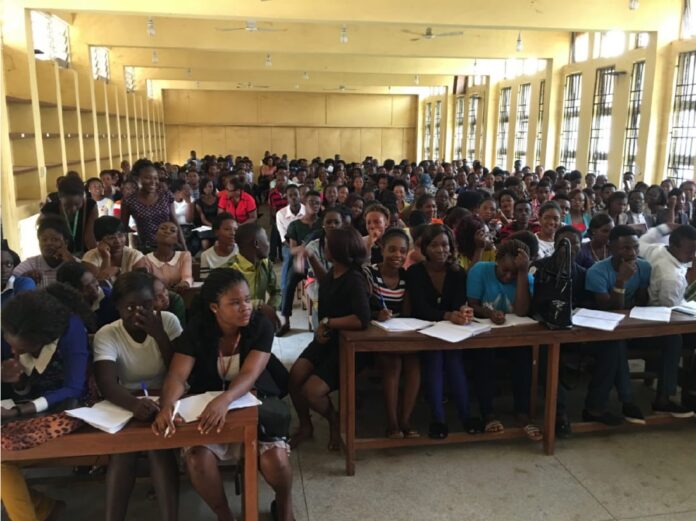The importance of cordial relationships between students and lecturers, by Nana Dawi Mshelia
As thousands of students embark on their higher education journey, they often face the daunting task of adjusting to a new environment, leaving behind the comfort and familiarity of home, family, and friends. This transition can be overwhelming, and it is essential that lecturers play a significant role in easing this process. The initial few weeks of university life can be particularly challenging, as students struggle to navigate unfamiliar surroundings, make new friends, and adapt to the academic demands of higher education. In an ideal academic setting, lecturers are expected to go beyond mere teaching and assume various paternal roles, offering moral and intellectual guidance, counselling, and support to their students.
In theory, the relationship between students and lecturers should be built on mutual respect, trust, and open communication. Lecturers should be approachable, empathetic, and willing to offer guidance and support whenever needed. This nurturing approach helps foster a cordial relationship, essential for academic success and personal growth.
When students feel comfortable approaching their lecturers, they are more likely to seek help when struggling, share their ideas and perspectives, and engage actively in the learning process.
Unfortunately, reality often falls short of this ideal. Many lecturers adopt a strictly businesslike attitude, limiting their interactions with students to mere academics. This detachment can leave students feeling isolated and unsupported, struggling to navigate the complexities of higher education.
READ ALSO: Humility is Key: Dr Hassan Gimba cites Gov Buni as a role model for student leaders
The consequences of this detachment can be far-reaching. Research has shown that positive relationships between students and lecturers significantly impact academic performance, retention rates, and overall student well-being. When lecturers invest time and effort in building rapport with their students, it creates a conducive learning environment, encouraging open communication and collaboration. Students who feel valued and supported are more likely to engage actively in class, participate in extracurricular activities, and develop essential life skills such as critical thinking, problem-solving, and teamwork. Conversely, students who feel disconnected from their lecturers may become disengaged, demotivated, and increasingly vulnerable to academic failure.
To bridge this gap, higher institutions must recognise the importance of fostering positive relationships between students and lecturers. This can be achieved through initiatives such as mentorship programmes, regular office hours, and interactive teaching methods. By providing opportunities for students to engage with lecturers outside of the classroom, institutions can foster a sense of community and belonging. Moreover, lecturers should be trained to recognise the emotional and psychological needs of their students. By adopting a more empathetic approach, lecturers can create a safe and supportive environment, encouraging students to open up about their challenges and concerns. This, in turn, can help lecturers tailor their teaching methods to meet the diverse needs of their students.
Students also have a role to play in cultivating these relationships. By actively seeking guidance, engaging in class discussions, and demonstrating respect for their lecturers, students can help establish a mutually beneficial dynamic. Students should be encouraged to take ownership of their learning, seek help when needed, and explore opportunities for growth and development. When students and lecturers work together, they can create a collaborative learning environment that fosters academic excellence, personal growth, and lasting connections.
Unfortunately, the prevailing culture in many higher institutions prioritises academic rigour over interpersonal connections. Lecturers are often overwhelmed with heavy workloads, leaving little time for meaningful interactions with students. This has resulted in a widening gap between students and lecturers, hindering the development of essential life skills. To address this, institutions must reevaluate their priorities, recognising that academic success is not solely dependent on intellectual ability, but also on the emotional and psychological well-being of students.
READ ALSO: How Kano lecturer survived brutal attack by student’s boyfriend
The importance of cordial relationships between students and lecturers cannot be overstated. These relationships have a profound impact on academic outcomes, student satisfaction, and the overall quality of the university experience. By investing in initiatives that foster positive relationships, higher institutions can reap long-term benefits, including improved academic performance, increased student retention, and a more supportive campus community.
Ultimately, the onus lies with higher institutions to prioritise the well-being and success of their students. By fostering cordial relationships between students and lecturers, institutions can create an environment that nurtures academic excellence, personal growth, and lasting connections. This requires a commitment to excellence, a willingness to adapt, and a recognition of the critical importance of interpersonal connections in the learning process.
As the academic year unfolds, stakeholders must recognise the critical importance of building positive relationships between students and lecturers. By working together, we can create an environment that values academic rigour, emotional intelligence, and interpersonal connections. By prioritising the well-being and success of students, higher institutions can shape the next generation of leaders, thinkers, and innovators.
In conclusion, bridging the gap between students and lecturers requires a multifaceted approach that involves institutional support, lecturer training, and student engagement. By recognising the importance of cordial relationships, we can create a more supportive, inclusive, and academically rigorous learning environment that benefits all stakeholders.
Nana Dawi Mshelia is a student of Mass Communication at the Muhammadu Buhari University of Maiduguri (formerly University of Maiduguri), Borno State.
Follow the Neptune Prime channel on WhatsApp:
Do you have breaking news, interview request, opinion, suggestion, or want your event covered? Email us at neptuneprime2233@gmail.com





